This article originally appeared in Delta, April 13, 2011. By Thomas van Dijk
For his PhD research, Dr Christos Strydis rethought the architecture for processors in biomedical implants.
 In future implants might be recharged by the brain. (Photo: Ana Laura Santos)
In future implants might be recharged by the brain. (Photo: Ana Laura Santos) Saying that they are committed to their research into neurostimulation is an understatement. In their quest to develop a treatment for patients with tinnitus, a syndrome where people hear phantom noises, Professor Dirk De Ridder, a neurosurgeon and neuroscientist at University Hospital Antwerp, and assistant professor Eddy van der Velden, a medical researcher at Antwerp’s Monica hospital, are about to be operated on themselves. During an experiment to be held at the end of this month, the professors will have wires sticking out of the back of their heads, through which electrical pulses will travel to their brains.
“They are really crazy,” says computer engineer, Dr Christos Strydis, laughing. In his office, Dr Strydis shows an application on his smart phone. With this app he will command the device – which is the size of a packet of cigarettes – that is attached to the guinea pig professors and generates the pulses. Depending on the frequency of the pulses, the test subjects might feel energetic, euphoric or sleepy, to name but a few of the possible states.
Strydis is part of a large team of researchers from the faculties of Electrical Engineering, Mathematics and Computer Science, and Applied Sciences, who over the years have been working with the Belgian medics on biomedical implants. The team’s goal is to develop tiny, low-energy consuming implants that can be controlled by software, rather than being based solely on hardwired circuits.
Strydis has been focusing on the type of processor needed for such devices. Last month he defended his PhD thesis, titled ‘Universal processor architecture for biomedical implants.’
Strydis believes that it’s time for a paradigm shift in the field of biomedical implants: “One big problem is that the electrical signals created by implants no longer aid patients with neurological diseases after a certain period of time, because the body simply gets used to the signals and ignores them. So the device should be smarter and more flexible. You should be able to programme it. What’s more, every patient is different, so standard implants with standard signals do not work optimally for everyone.”
It will take at least another five years before the device built by the Delft researchers will be miniaturised enough to be placed directly under the skull of patients, Strydis surmises. Neuroscientist Prof. van der Velden hopes that the battery inside the implant, which ultimately must work at a voltage of no more than half a millivolt, will be recharged by the brain.

 Since the algorithm for computing the impact factor is simple, it is also simple to manipulate. And this is exactly what is being done constantly, by authors, who for this reason include a lot of self-citations in their manuscripts, and by journals that impose a lot of self-citations (to the journal) on their authors. Since this is seriously blurring the reputation of people and journals, but also the minds of our evaluators, more objective figures-of-merit have been discussed, the most elegant one probably being the Article Influence. If you are interested you may wish to (and if you are a boss of a scholar or a scholar yourself, you probably should) check out
Since the algorithm for computing the impact factor is simple, it is also simple to manipulate. And this is exactly what is being done constantly, by authors, who for this reason include a lot of self-citations in their manuscripts, and by journals that impose a lot of self-citations (to the journal) on their authors. Since this is seriously blurring the reputation of people and journals, but also the minds of our evaluators, more objective figures-of-merit have been discussed, the most elegant one probably being the Article Influence. If you are interested you may wish to (and if you are a boss of a scholar or a scholar yourself, you probably should) check out  Besides many research related posts on this weblog, there is another important aspect in universities: education. Currently the spring examinations take place. It is time to see if our efforts in introducing the students into the exciting world of transistors were good enough. Today I was supervising a retake of a first year BSc-course. In order not to get too bored, I printed out a bunch of papers to read through…
Besides many research related posts on this weblog, there is another important aspect in universities: education. Currently the spring examinations take place. It is time to see if our efforts in introducing the students into the exciting world of transistors were good enough. Today I was supervising a retake of a first year BSc-course. In order not to get too bored, I printed out a bunch of papers to read through… Still in shock by the post below? Don’t be. As always there’s hope on the horizon. The slides of the Hermes Partnership Workshop "Visions Towards ICT Supported Health" of last week have been posted online. If you want to find out more about one or more of the topics below, don’t hesitate to click
Still in shock by the post below? Don’t be. As always there’s hope on the horizon. The slides of the Hermes Partnership Workshop "Visions Towards ICT Supported Health" of last week have been posted online. If you want to find out more about one or more of the topics below, don’t hesitate to click  To make it a little more concrete for you; the population is graying all over the globe, not only in western Europe (as I initially thought), with some countries lagging only a little bit behind, such as those in Latin America, Africa and China; the latter catching up quite rapidly, by the way. Soon there will be more people that are either not yet working (as they are still in their nappies, at school, etc.), have retired already or are chronically ill than there will be people that participate in the work force.
To make it a little more concrete for you; the population is graying all over the globe, not only in western Europe (as I initially thought), with some countries lagging only a little bit behind, such as those in Latin America, Africa and China; the latter catching up quite rapidly, by the way. Soon there will be more people that are either not yet working (as they are still in their nappies, at school, etc.), have retired already or are chronically ill than there will be people that participate in the work force.  Don’t get me wrong here; this is still more exciting than an ordinary day at the shop. Marijn and Christos are making the final preparations on the uStim, our flexible neurostimulator, which soon will be tried out in vivo; Wannaya and June are working very hard on the circuit design and layout generation of the analog bionic ear; Marcel is working towards the completion of his PhD thesis and having the forms filled in to also publish it as a book — the first on Structured Design of EMI resilient analog circuits; Senad is wrapping up the simulations on a L2-optimized wavelet filter, to appear in a paper currently under review for prospective publication in IEEE Transactions on Circuits and Systems; Duan is designing a proof-of-principle experiment of the world’s first subsampling jitter-compensated software defined radio; Andre is trying to improve the efficiency of an RF energy harvester for a batteryless ultra lowpower radio; Yongjia is working hard on the circuit definition of an asynchronous level-crossing ADC for analog-to-digital conversion of non-stationary signals, such as ECG, EEG, ECoG, etc; Mark is thinking about how to combine an energy harvester with an ultra lowpower ultrawideband tag, but also a little about his exciting holiday ahead; the many MSc students are working hard on their MSc project and I am working hard on my invited presentation at the International Symposium on Medical Information and Communication Technology. If you want to have a glimpse of what I will be discussing there, check out the following movie/documentary of "
Don’t get me wrong here; this is still more exciting than an ordinary day at the shop. Marijn and Christos are making the final preparations on the uStim, our flexible neurostimulator, which soon will be tried out in vivo; Wannaya and June are working very hard on the circuit design and layout generation of the analog bionic ear; Marcel is working towards the completion of his PhD thesis and having the forms filled in to also publish it as a book — the first on Structured Design of EMI resilient analog circuits; Senad is wrapping up the simulations on a L2-optimized wavelet filter, to appear in a paper currently under review for prospective publication in IEEE Transactions on Circuits and Systems; Duan is designing a proof-of-principle experiment of the world’s first subsampling jitter-compensated software defined radio; Andre is trying to improve the efficiency of an RF energy harvester for a batteryless ultra lowpower radio; Yongjia is working hard on the circuit definition of an asynchronous level-crossing ADC for analog-to-digital conversion of non-stationary signals, such as ECG, EEG, ECoG, etc; Mark is thinking about how to combine an energy harvester with an ultra lowpower ultrawideband tag, but also a little about his exciting holiday ahead; the many MSc students are working hard on their MSc project and I am working hard on my invited presentation at the International Symposium on Medical Information and Communication Technology. If you want to have a glimpse of what I will be discussing there, check out the following movie/documentary of "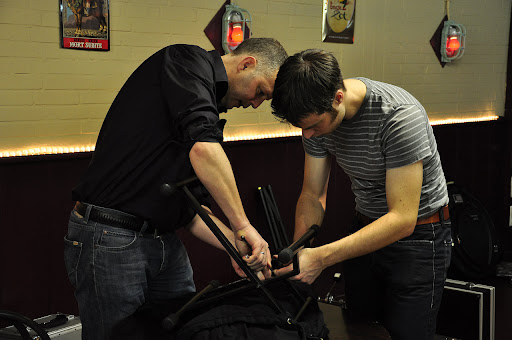




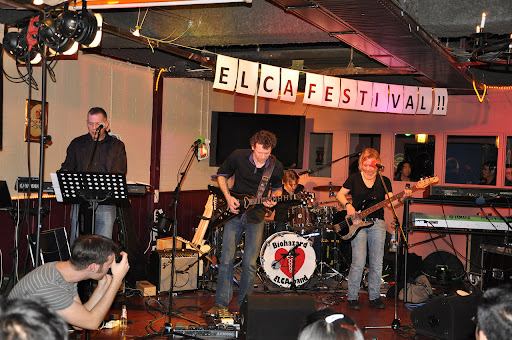
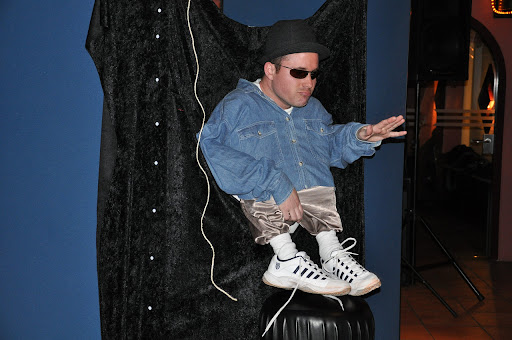
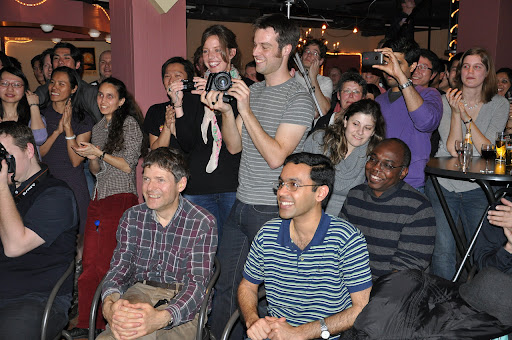

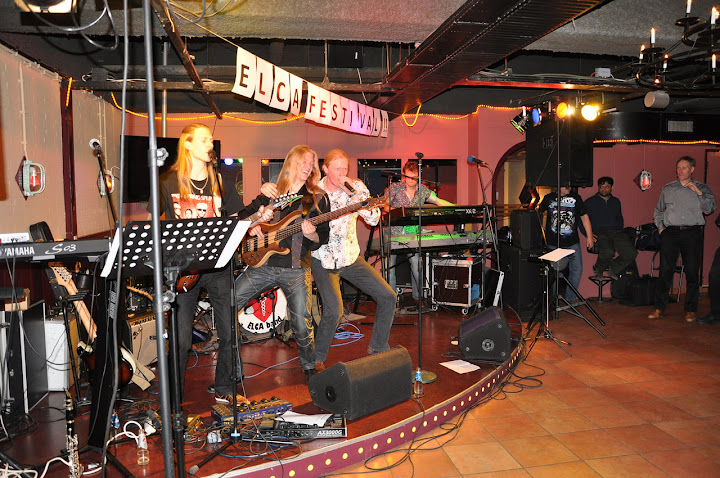

 So why the title of this blog then? Well, I was reading the thread at
So why the title of this blog then? Well, I was reading the thread at  While enjoying lunch, the Biomedical Electronics Group gathered in the Davidse room (named after the former head of the Electronics Research Lab and also my "promotor", Jan Davidse) to listen to three presentations. The first one was by Duan Zhao, on an interesting new way of bridging the gap to low-power software radios by means of subsampling. After an introduction on the operation of a subsampling receiver, he explained to us a technique to remove the jitter originating from the sampling clock by using a harmonically related reference. Currently Duan is working hard on a manuscript to be submitted to GlobeCom.
While enjoying lunch, the Biomedical Electronics Group gathered in the Davidse room (named after the former head of the Electronics Research Lab and also my "promotor", Jan Davidse) to listen to three presentations. The first one was by Duan Zhao, on an interesting new way of bridging the gap to low-power software radios by means of subsampling. After an introduction on the operation of a subsampling receiver, he explained to us a technique to remove the jitter originating from the sampling clock by using a harmonically related reference. Currently Duan is working hard on a manuscript to be submitted to GlobeCom.